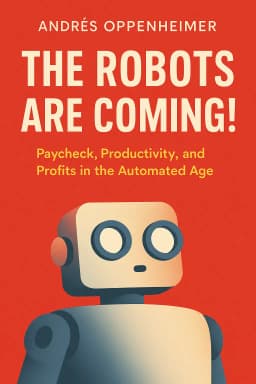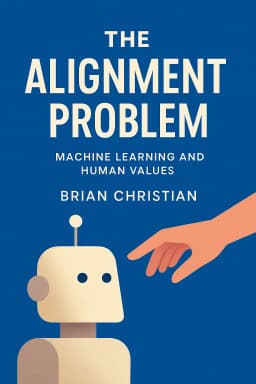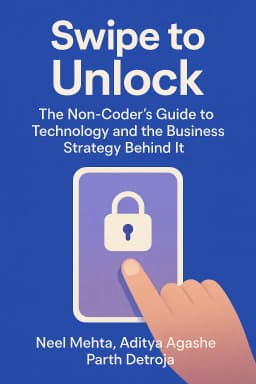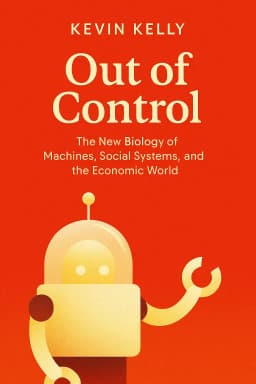
Is Your Career the Next Kodak?
Golden Hook & Introduction
SECTION
Joe: A 2013 Oxford study predicted that 47% of all U.S. jobs are at high risk of being automated away in the next 15 to 20 years. Lewis: Okay, that’s almost half. But here’s the real kicker: that was over a decade ago. We’re already living in that future. The clock is ticking, and for many, the alarm has already gone off. Joe: And that’s the terrifying, thrilling world we’re diving into today with Andrés Oppenheimer’s book, The Robots Are Coming!: Paycheck, Productivity, and Profits in the Automated Age. Lewis: What I love about this is that Oppenheimer is a Pulitzer Prize-winning journalist, not a tech bro from Silicon Valley. He comes at this from a global, human perspective, which makes his findings feel less like a product pitch and more like a warning from a very smart, very concerned friend. Joe: Exactly. He’s reported from all over the world, and he brings that investigative rigor to this question that haunts all of us: are our jobs safe? He starts the book by acknowledging the classic argument we always hear: technology has always destroyed jobs, but it’s always created more new ones. Lewis: Right, the old "don't worry, be happy" line. The Luddites were wrong, the farmers who were replaced by tractors found new work, and so on. So, what’s the catch this time? Joe: The catch, Oppenheimer suggests, is speed and scale. The pace of disruption today is unlike anything we've ever seen. And to understand it, he takes us back to two corporate graveyards that should send a shiver down every CEO's spine.
The 'Is This Time Different?' Dilemma
SECTION
Lewis: Oh, I have a feeling I know where this is going. This is the part where we all get a little paranoid about our own careers, isn't it? Joe: It absolutely is. Let's talk about Kodak. In its heyday, this was a giant. A titan of industry. At its peak, it employed 140,000 people, mostly in Rochester, New York. It was a city built on film photography. Lewis: A household name. My parents probably have boxes of Kodak photos in their attic right now. Joe: Everyone did. But they made a fatal mistake. They invented the first digital camera but were so invested in their film business that they buried it. They couldn't imagine a world without film. Meanwhile, in 2010, a tiny startup called Instagram launched. Lewis: With, what, a dozen employees? Joe: Thirteen, to be exact. Just thirteen people. Two years later, in 2012, Kodak, with its 140,000-person legacy, filed for bankruptcy. Instagram, with its thirteen employees, was acquired for a billion dollars. The value didn't disappear; it just migrated from a massive employer to a tiny one. Lewis: That is a brutal comparison. 140,000 jobs versus 13. It’s not just a new machine replacing an old one; it's an entire ecosystem being wiped out by an app. Joe: Precisely. And it wasn't a one-off. Oppenheimer gives us the same story with Blockbuster. Remember Friday nights at Blockbuster? Lewis: Of course! The smell of popcorn and plastic VHS cases. The crushing disappointment when the new release you wanted was already rented out. A core childhood memory. Joe: Blockbuster employed 60,000 people in its thousands of stores worldwide. They were a cultural institution. But they were obsessed with their brick-and-mortar model and, infamously, their late fees. They even had a chance to buy a fledgling competitor for a mere $50 million. Lewis: Let me guess. The competitor was Netflix. Joe: You got it. They laughed them out of the room. A few years later, Blockbuster was bankrupt. 60,000 jobs, gone. And Netflix, which was a tiny mail-order service at the time, became the new giant, employing a fraction of the people. Lewis: Wow. So the question Oppenheimer is posing is, are we all just Kodak employees in 2010? Are we all working at Blockbuster and scoffing at the little red envelope in the mail? It makes you wonder what industry is the 'Kodak' of today. Joe: That's the core of the anxiety. Oppenheimer argues that this isn't just about factory workers anymore. Tech leaders themselves are sounding the alarm. Bill Gates said back in 2014 that in 20 years, the demand for a lot of skills will be substantially lower. Even Mark Zuckerberg, a guy who built his empire on this disruption, admitted that technology and automation are eliminating many jobs. Lewis: It’s one thing for a journalist to say it, but when the architects of this new world are telling you to be worried, you should probably listen. So if it's not just the obvious jobs, who's next on the chopping block? Joe: This is where the book gets really fascinating, and frankly, a little unsettling. Oppenheimer argues the robots are coming for the white-collar jobs. The ones we thought were safe. The ones that required a college degree, critical thinking, and years of experience. They're coming for the lawyers, the doctors, the journalists. Lewis: Hold on. A robot lawyer? A robot doctor? That sounds like pure science fiction. How can a machine replicate the nuance, the judgment, the human element of those professions? Joe: You'd think it's impossible. But Oppenheimer presents some cases that make you question everything you assume about human expertise. It turns out, our human element, with all its biases and limitations, might be our biggest vulnerability.
The Ghost in the Machine
SECTION
Lewis: Okay, I'm skeptical but intrigued. What do you mean our 'human element' is a vulnerability? I thought that was our superpower. Joe: Well, let's look at the legal world. Oppenheimer tells this incredible story about a study of Israeli judges. Researchers analyzed over a thousand parole rulings made by eight experienced judges over a ten-month period. They were looking for a pattern. Lewis: And what did they find? That the judges were tougher on certain crimes? Joe: Nothing so logical. They found that a prisoner's chance of being granted parole depended heavily on what time of day their case was heard. If your case was first thing in the morning, you had about a 65% chance of getting parole. Lewis: Okay, that seems reasonable. The judge is fresh, ready to go. Joe: But as the morning wore on, that number plummeted. Right before the judges took their lunch break, the parole rate dropped to nearly zero. Lewis: What? Why? Joe: And then, after the judges came back from lunch, the parole rate shot right back up to 65%. The researchers concluded that the single biggest factor in these life-altering decisions wasn't the facts of the case, the prisoner's rehabilitation, or the legal arguments. It was whether the judge was hungry. It was decision fatigue and blood sugar levels. Lewis: That is genuinely terrifying. My freedom could depend on whether a judge had a sandwich? Joe: Exactly. Now, imagine an algorithm. It doesn't get hungry. It doesn't get tired. It doesn't have a bad morning because it got in a fight with its spouse. It just analyzes the data. Who's the more impartial judge now? Lewis: Wow. Okay, when you put it like that... it’s hard to argue. So this isn't just theoretical? Joe: Not at all. Oppenheimer introduces us to "Ross," an AI attorney powered by IBM's Watson. In 2016, the major law firm BakerHostetler "hired" Ross to work in its bankruptcy division. Ross can read millions of pages of case law in seconds, find relevant precedents, and deliver a concise summary. It does the work of a team of junior associates, but it never sleeps, never asks for a raise, and never makes a mistake due to fatigue. Lewis: So Ross is like a super-paralegal that has read every law book ever written and has a photographic memory. Joe: A perfect analogy. The firm, of course, said Ross was a "supplemental tool," not a replacement. But the CEO of the company that makes Ross has a stated goal: to have Ross on the legal team of every lawyer in the world. Lewis: For now, it's a tool. But you can see the writing on the wall. First, they automate the research. Then the document drafting. How long until the AI gets good at crafting legal strategy, too? Joe: And it's the same story in my own field, journalism. Oppenheimer talks about The Washington Post's robot reporter, Heliograf. During the 2016 Olympics, Heliograf wrote hundreds of articles—short reports on medal counts and event results. They were basic, but they were accurate and instantaneous. Lewis: So it’s like a super-intern for the Post, handling the boring, data-driven stuff so the star reporters can go chase the big, investigative stories. Joe: That's exactly how the paper's editor frames it. He says, "The machine is very good at telling you what happened, but it’s not as great at understanding why that thing happened." But even that is changing. Heliograf is now writing articles on local elections and high school sports, providing coverage for communities that newspapers could never afford to send a human reporter to. Lewis: That's actually a good thing, then. It's expanding coverage. Joe: It is, but it also raises a scary question. The book talks about the author's own experience with Google Translate. For decades, he paid human translators to convert his columns to Spanish. One day, he tried the new AI-powered Google Translate and was stunned. It was nearly perfect. He said the program had improved more in a few weeks than it had in the previous decade. He stopped using his human translators. Those jobs are just... gone. Lewis: That's the quiet, creeping nature of it. It's not a robot army marching down the street. It's an app update. It's a software feature that gets a little bit better every day until, one morning, it's better than you. Joe: And that brings us to the billion-dollar question that Oppenheimer spends the rest of the book trying to answer. If the robots are taking all the routine jobs, both manual and cognitive... what is left for us? Lewis: Yeah, this is the part I'm waiting for. After all this doom and gloom, is there any hope? Or should we all just start practicing our welcome speeches for our new robot overlords? Joe: There is hope. And it's a powerful, counterintuitive kind of hope. Oppenheimer argues that this technological wave, as terrifying as it is, might be the very thing that forces us to become more human, not less.
The Human Renaissance
SECTION
Lewis: Okay, 'more human.' I like the sound of that, but what does it actually mean in terms of a job? What does a 'more human' career look like? Joe: It means focusing on the skills that are, for the foreseeable future, impossible to automate. Oppenheimer lays out a vision for the future of work that revolves around things like creativity, critical thinking, emotional intelligence, empathy, and collaboration. Lewis: The so-called 'soft skills' that business schools are always talking about. Joe: Exactly, but with a new urgency. He argues that if your job can be easily explained or broken down into a set of rules, it can and will be automated. The jobs of the future are the ones that can't be put in a manual. Think about a therapist, a kindergarten teacher, a creative director, a scientist having a breakthrough insight. Lewis: Right, you can't write an algorithm for empathy. You can't code a 'eureka' moment. Joe: Precisely. And he lists what he believes are the top ten job fields of the future. Some are what you'd expect: robot maintenance technicians, data analysts, digital security guards. But others are surprising. He talks about a massive, growing need for health care assistants. Lewis: That makes sense, with an aging population. Joe: But it's not just about physical care. He tells this amazing story about the United Kingdom, where loneliness has become such a public health crisis that in 2018, the Prime Minister appointed a "Minister for Loneliness." Lewis: A Minister for Loneliness? That sounds like something out of a Wes Anderson movie. Joe: It's real! And tech forecasters are predicting the rise of a new job: the "walker/talker" or "people walker." Essentially, a paid companion for the elderly. Someone to talk to, to go for a walk with, to provide that basic human connection that is as vital to our health as medicine. Lewis: So the future of work isn't just about everyone becoming a coder. It might be about becoming a professional friend. That's... kind of beautiful, actually. Joe: It is! And it highlights the core message. The more efficient and data-driven our world becomes, the more we will crave, and pay for, genuine human interaction. The list also includes artists, entertainers, and product designers—the creators. And it includes teachers, but with a radically different role. Lewis: This is a big one for me. If information is free and a robot can explain the Pythagorean theorem perfectly, what's a teacher for? Joe: Oppenheimer argues the teacher's role shifts from being a "sage on the stage" to a "guide on the side." They become motivators, mentors, and personal therapists. Their job isn't to transmit information anymore; it's to inspire curiosity, teach resilience, foster teamwork, and instill ethical values. Lewis: That means our entire education system is fundamentally broken, then. We're still running on a factory model, designed to produce compliant workers for the industrial age. We're teaching kids to be good little calculators when we should be teaching them how to be creative, collaborative, and empathetic. Joe: He couldn't agree more. He calls for a revolution in education. And he lives it. He shares his own story, how he defied his family's wishes to pursue his passion for journalism, a low-paying and difficult field. He argues that the single most important thing we can do for our children is to help them find their passion. Because in a world of constant change, passion is the engine that drives lifelong learning and reinvention. Lewis: That's a powerful message. It's not about picking the 'right' major that will be obsolete in ten years. It's about developing the internal drive to keep learning for the next fifty years. Joe: Exactly. It's a shift from a fixed mindset to a growth mindset, not just for individuals, but for our entire society.
Synthesis & Takeaways
SECTION
Joe: So when you pull it all together, the journey Oppenheimer takes us on is pretty profound. We start with the raw fear of being replaced by a machine, like a Kodak engineer watching Instagram take over the world. Lewis: Then we move to the intellectual shock of realizing that even our brains, our expertise as lawyers or doctors, can be replicated and in some cases, surpassed by an algorithm that doesn't get tired or hungry. Joe: And we land on this incredibly hopeful, and very human, conclusion. The more we outsource routine work and even routine thinking to machines, the more valuable our own unique human qualities become. The future belongs to the creative, the empathetic, the collaborative. Lewis: The paradox is that the rise of artificial intelligence is forcing us to double down on our natural intelligence. It's a call to action to cultivate the parts of ourselves that can't be quantified or coded. Joe: It really forces you to ask yourself a fundamental question, and it's one I think everyone listening should consider. Lewis: What's that? Joe: What is the one thing you do, in your work or in your life, that a robot truly can't? What is your uniquely human contribution? Is it your creativity? Your ability to connect with people? Your strategic insight? Lewis: That’s the perfect question. Because whatever the answer is, that’s your anchor in the storm that’s coming. That's your future. Joe: We'd love to hear your thoughts. What's your answer to that question? Let us know what you think on our social channels. We read everything. Lewis: This is Aibrary, signing off.









